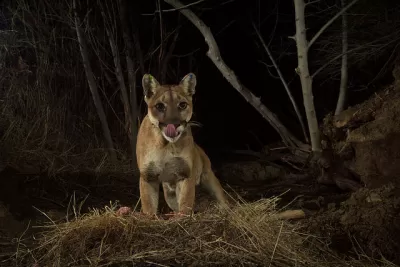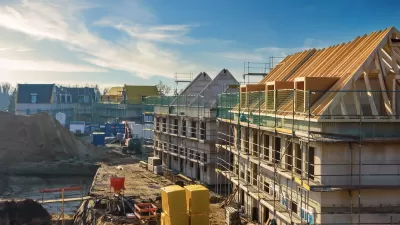Encouraging denser development in urbanized areas is an effective way to protect sensitive flora and fauna from human encroachment.

Protecting sensitive wildlife and building more housing don't have to be mutually exclusive, argues J.P. Rose, senior attorney at the Center for Biological Diversity. "For decades we have built in areas without careful consideration of how it affects wildlife. Sprawling overdevelopment has helped bring us to this extinction crisis — one in which the Quino checkerspot butterflies that once thrived in Southern California are now extremely rare and iconic mountain lions are suffering from inbreeding and genetic isolation."
But protecting wildlife doesn't have to come at the expense of affordable housing, a point brought into sharp relief in February, when the Northern California town of Woodside attempted to evade state housing mandates by designating the entire community as mountain lion habitat.
When my colleagues at the Center for Biological Diversity and I petitioned the California Fish and Game Commission to list Southern California and Central Coast mountain lions as a threatened species, we were not proposing to ban development throughout the state.
Instead, we wanted state officials to help these imperiled cats by building wildlife crossings, prohibiting rat poison use and factoring in how new development affects connectivity.
As Rose writes, the solution is infill development. "It’s time to stop seeing large swaths of open space as the best places to build. Cities and counties must steer development toward jobs and transportation centers to address the need for affordable housing. Focusing on wildlife-friendly infill development and building up, not out, is the thoughtful way to grow."
"In Ventura County, the board of supervisors passed two ordinances that increase protections for wildlife corridors by setting development standards and requiring environmental review for projects that block connectivity." Rose praises these ordinances, saying he hopes that similar policies will follow in more communities.
FULL STORY: Guest column: California has room for mountain lions and affordable housing

Alabama: Trump Terminates Settlements for Black Communities Harmed By Raw Sewage
Trump deemed the landmark civil rights agreement “illegal DEI and environmental justice policy.”

Study: Maui’s Plan to Convert Vacation Rentals to Long-Term Housing Could Cause Nearly $1 Billion Economic Loss
The plan would reduce visitor accommodation by 25% resulting in 1,900 jobs lost.

Planetizen Federal Action Tracker
A weekly monitor of how Trump’s orders and actions are impacting planners and planning in America.

Wind Energy on the Rise Despite Federal Policy Reversal
The Trump administration is revoking federal support for renewable energy, but demand for new projects continues unabated.

Passengers Flock to Caltrain After Electrification
The new electric trains are running faster and more reliably, leading to strong ridership growth on the Bay Area rail system.

Texas Churches Rally Behind ‘Yes in God’s Back Yard’ Legislation
Religious leaders want the state to reduce zoning regulations to streamline leasing church-owned land to housing developers.
Urban Design for Planners 1: Software Tools
This six-course series explores essential urban design concepts using open source software and equips planners with the tools they need to participate fully in the urban design process.
Planning for Universal Design
Learn the tools for implementing Universal Design in planning regulations.
Caltrans
Smith Gee Studio
Institute for Housing and Urban Development Studies (IHS)
City of Grandview
Harvard GSD Executive Education
Toledo-Lucas County Plan Commissions
Salt Lake City
NYU Wagner Graduate School of Public Service





























